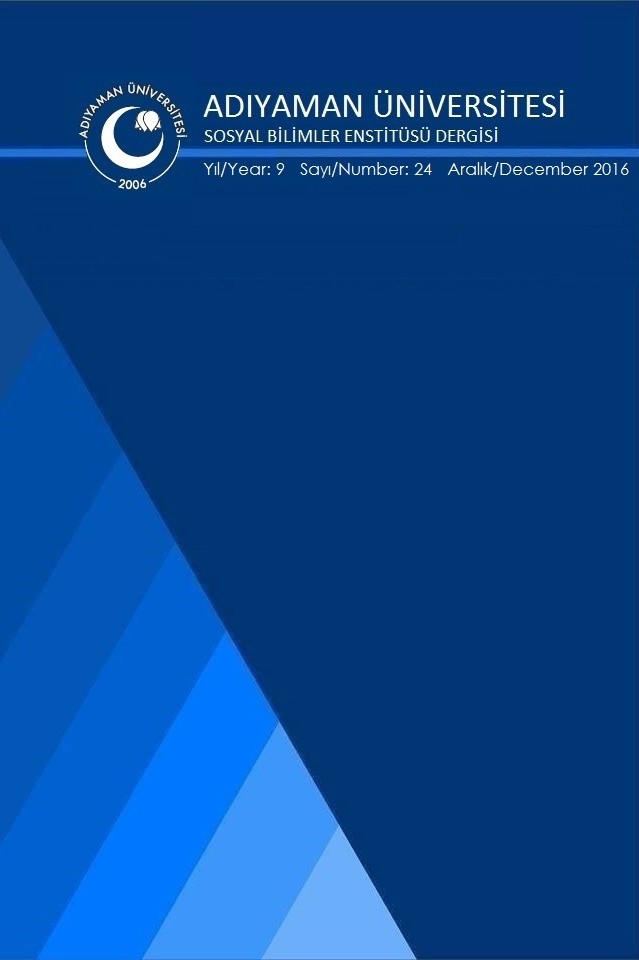ÜNİVERSİTELERDE DİL ÖĞRENME / ÖĞRETİMİNDE ÇEVRİMİÇİ EĞİTİM: COVID-19 VE DİJİTAL DÖNÜŞÜM
Covid -19 salgını hiç şüphesiz daha yüksek öğrenim kurumlarında dil öğreniminde ve öğretiminde dijital dönüşümün gerçekleştirilme şeklini değiştirdi ve hızlı bir şekilde bu alana geçilmesine yönlendirdi. Yabancı dil öğreniminde ve öğretiminde dijital dönüşümün etkisini göstermek ve dijital uygulamanın öğrenciler üzerindeki etkisini ortaya çıkarmak için ihtiyaç duyulan önemli verileri toplamak için öğrencilere ve öğretmenlere gönüllük esasına dayalı araştırma soruları yöneltildi. Katılımcılar, Gagavuzya'daki Komrat Üniversitesi İngilizce bölümünde 103 öğrenci ve 35 öğretim görevlisiydi. Elde edilen sonuçlara göre, katılımcıların%42'si çevrimiçi platformun sınavlar sırasında kusursuz olduğuna inanıyordu. Öte yandan, %71,7'si çevrimiçi platformun daha interaktif veya daha kullanışlı olduğuna inanmadığını belirtti. Bu sonuçlar, dijital platformda öğretime dahil olan yüksek öğretim kurumlarının, öğrencileri etkileşimli ve profesyonel bir şekilde meşgul etmelerini sağlamak için ek becerilere ihtiyaç duyduğunu ortaya koymaktadır.
Anahtar Kelimeler:
DijitalDönüşüm, YabancıDil, Dijital platform
ONLINE EDUCATION IN LANGUAGE LEARNING/TEACHING IN UNIVERSITIES: THE COVID-19 AND DIGITAL TRANSFORMATION
The Covid -19 pandemic has no doubt changed and fast-tracked the way digital transformation in language learning and teaching is being conducted in higher institutions of learning. Research questions were asked to students and teachers on a voluntary basis to collect substantial data needed to illustrate the influence of digital transformation in foreign language learning and teaching and reveal the effect of digital practice on students. The participants were 103 students and 35 lecturers at the English department at the Komrat University in Gagavuzia. The instrument used for data collection was survey questions. According to the results obtained, 42% of the participants believed that the online platform was foolproof during exams. On the other hand, 71,7% stated that they did not believe that the online platform was more interactive or convenient. These results reveal that higher education institutions involved in teaching on the digital platform need additional skills to ensure they engage students interactively and professionally.
Keywords:
Digital Transformation, Foreign Language, Digital platform.,
___
Altbach, G., & De Wit, H. (2020). Post pandemic outlook for higher education is bleakest for the poorest. International Higher Education, 102, 3–5Alshammari, S. (2020).THE INFLUENCE OF TECHNICAL SUPPORT, PERCEIVED SELF-EFFICACY, AND INSTRUCTIONAL DESIGN ON STUDENTS’ USE OF LEARNING MANAGEMENT SYSTEMS: Turkish online Journal Of DistanceEducation:https://dergipark.org.tr/en/pub/tojde/issue/55722/762034
Alwi, N. (2010). E- Learning and information security management. International Journal of Digital Society, Vol 1( 2) : https://www.researchgate.net/publication/224110301_Information_security_management_in_E-learning
Barbero, S.(2020).COVID-19 has accelerated the digital transformation of higher education; https://www.weforum.org/agenda/2020/07/covid-19-digital-transformation-higher-education/
BARDAKCI, S., ARSLAN, O., & CAN, Y. (2018). Online Learning and High School Students: A Cultural Perspective. Turkish Online Journal Of Distance Education, 126-146. https://doi.org/10.17718/tojde.471909
Bagci, H. (2018). An Overview of Technology, Guidance and Leadership in Terms of Education. Cambridge: Cambridge Scholars Publishing
Carter, M. (2013). A Study of Students’ Perceptions of the Online Component of a Hybrid Postgraduate Course. Procedia - Social And Behavioral Sciences, 84, 558-568. https://doi.org/10.1016/j.sbspro.2013.06.604
Cole, A., Lennon, L., & Weber, N. (2019). Student perceptions of online active learning practices and online learning climate predict online course engagement. Interactive Learning Environments, 1-15. https://doi.org/10.1080/10494820.2019.1619593
Das, M. (2014). Effect of Values and Business Ethics Course on Students' Perception of Ethics in Business: An Empirical Investigation of Management Students in Tripura. Prabandhan: Indian Journal Of Management, 7(3), 43. https://doi.org/10.17010//2014/v7i3/59299
Davis, N., &Roblyer, M. (2005). Preparing Teachers for the “Schools That Technology Built”. Journal Of Research On Technology In Education, 37(4), 399-409. https://doi.org/10.1080/15391523.2005.10782445
Foresman, B. (2020). University CIOs are becoming business leaders, says education report; https://edscoop.com/educause-top-10-it-issues-2020-report/
Glasgow, Z. (1977). Learning Systems Research, Development Testing and Evaluation. Journal Of Educational Technology Systems, 5(4), 321-329. https://doi.org/10.2190/c3u1-frnk-3aru-0a4j
Grajek, S. (2020).How Colleges and Universities Are Driving to Digital Transformation Today: https://er.educause.edu/articles/2020/1/how-colleges-and-universities-are-driving-to-digital-transformation-today
Husband, G. (2015). The impact of lecturers’ initial teacher training on continuing professional development needs for teaching and learning in post-compulsory education. Research In Post-Compulsory Education, 20(2), 227-244. https://doi.org/10.1080/13596748.2015.1030262
Leng, P., Khieng, S. & Water, T.(2020).Going digital – The second phase of HE transformation: https://www.universityworldnews.com/post.php?story=20200623154410596
Martin, F., Stamper, B., & Flowers, C. (2020). Examining Student Perception of Readiness for Online Learning: Importance and Confidence. Online Learning, 24(2). https://doi.org/10.24059/olj.v24i2.2053
Trespalacios, J., &Florez, L.(2020). Developing Online Sense of Community: Graduate Students’ Experiences and Perceptions: Turkish online Journal Of Distance Education: https://repository.globethics.net/handle/20.500.12424/3960700
Rapanta et al.(2020). Online University Teaching During and After the Covid-19 Crisis: Refocusing Teacher Presence and Learning Activity. Post Digital Science and Education; https://link.springer.com/article/10.1007/s42438-020-00155-y
Richardson, J., Hollis, E., Pritchard, M., &Novosel-Lingat, J. (2020). Shifting Teaching and Learning in Online Learning Spaces: An Investigation of a Faculty Online Teaching and Learning Initiative. Online Learning, 24(1). https://doi.org/10.24059/olj.v24i1.1629
Wilkes, M., & Bligh, J. (1999). Evaluating educational interventions. BMJ, 318(7193), 1269-1272. https://doi.org/10.1136/bmj.318.7193.1269
- ISSN: 1308-9196
- Yayın Aralığı: Yılda 3 Sayı
- Başlangıç: 2008
- Yayıncı: Adıyaman Üniversitesi
Sayıdaki Diğer Makaleler
TÜRKİYE’DE TURİZM GELİRİNİ ETKİLEYEN FAKTÖRLERİN ÖNEM DÜZEYLERİNİN BELİRLENMESİ
YAZINSALDAN GÖRSEL SOMUTLAŞTIRMAYA ÜTOPYALARDA MEKAN KURGUSU
VATANDAŞLIK BAĞLAMINDA SURİYELİ SIĞINMACILAR
ÜNİVERSİTELERDE DİL ÖĞRENME / ÖĞRETİMİNDE ÇEVRİMİÇİ EĞİTİM: COVID-19 VE DİJİTAL DÖNÜŞÜM
İŞLETMELERİN E-TİCARET YAPMAMASININ NEDENLERİ: COVID-19 DÖNEMİ BOYUNCA İŞLETME DAVRANIŞI
ARAPKİR ONAR KÖYÜNDE TÜRK ESERLERİ
KARAR ALMA SÜREÇLERİNDEKİ DIŞSAL ZORLAYICILAR: TÜRKİYE İÇİN GÖÇ POLİTİKASI MÜMKÜN MÜ?
ELEKTRONİK İNSAN KAYNAKLARI YÖNETİMİ VE ÖRGÜTSEL GÜVEN İLİŞKİSİ: SİİRT ÜNİVERSİTESİ PERSONELİ ÖRNEĞİ
ROMA YÖNETİMİNE GEÇİŞTE MISIR’DAKİ HUKUKSAL DEĞİŞİMLER (İÖ 30-İS 14)
